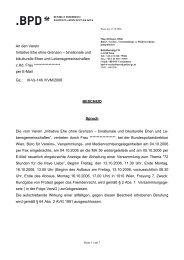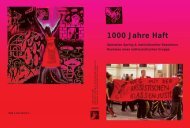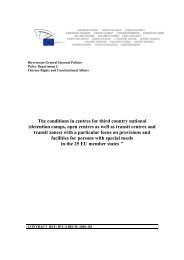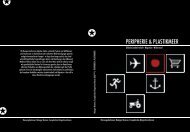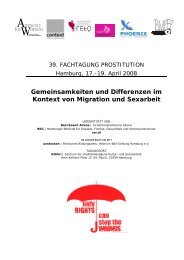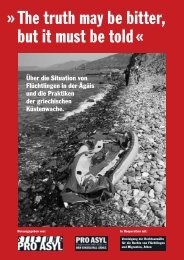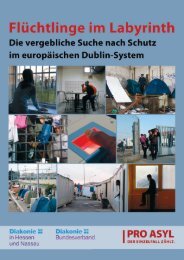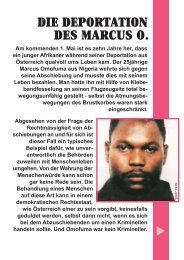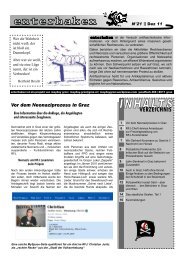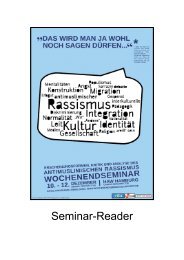Turin's CIE - International University College of Turin
Turin's CIE - International University College of Turin
Turin's CIE - International University College of Turin
Create successful ePaper yourself
Turn your PDF publications into a flip-book with our unique Google optimized e-Paper software.
must take into consideration the best interests <strong>of</strong> the child, family life and health <strong>of</strong> the people<br />
concerned 22 .<br />
2. <strong>CIE</strong> DETAINEES WITH STRONG FAMILY AND PRIVATE LIVES IN ITALY<br />
In the course <strong>of</strong> this research, we interviewed some detainees who had been married to or had<br />
children with Italian or EU citizens. A person without documents has the right to marry in<br />
Italy 23 . Moreover, the Article 8 ECHR right to family and private life can include unmarried<br />
couples 24 . During this research it was <strong>of</strong>ten unclear whether the detainees who were married to<br />
Italian or other EU citizens had been married via <strong>of</strong>ficial legal means, or whether they had been<br />
married in religious or community ceremonies without an accompanying Italian legal marriage<br />
registration process.<br />
One detainee moved to Italy in 2006 with her Italian ex-husband, to whom she was legally<br />
married at the time <strong>of</strong> her arrival. She seemed to be very integrated in Italy, having worked in<br />
Milan’s fashion industry as well as in hospitality. Her current partner is also Italian, although<br />
they are not married. She had a valid identity card and she was confused about how it was<br />
possible to have a valid identity card without a permit to stay. In fact, the detainee had hosted a<br />
house party and she herself had called the police because an unwelcome guest was too drunk<br />
and refused to leave her house. The police then checked everyone’s documents and found that<br />
the host’s own permit to stay had in fact expired and she was transported to <strong>CIE</strong>.<br />
Another detainee explained that he had been living in Italy on a long-term basis with an Italian<br />
wife:<br />
“When I arrived in Italy I was without documents, then I married an Italian girl and I had a<br />
permit to stay. I returned to my country and then I returned to Italy without problems. I<br />
also worked here with my wife, we had a bar. The police however came to the bar and<br />
caused a racket. I fought with them and I gave a slap to the <strong>of</strong>ficer. They sent me to prison<br />
where I did some months [two months] and then house arrest. After prison [in 2007] I still<br />
had my permit to stay. However they’d had it with me and they made me close the bar. I<br />
made a request for a permit to stay the last time in 2010. However, they refused to give me<br />
the permit to stay and with my lawyer we appealed. Now in 2012 I am waiting for a<br />
response. Then two months ago the police stopped me on the street, but I had left my wallet<br />
at home. I told them to accompany me home to take the documents but they took me to the<br />
barracks and from there to Questura 25 and from there to <strong>CIE</strong>” (Interview 27).<br />
Sometimes both a husband and wife are detained in <strong>CIE</strong>:<br />
“There has been one case <strong>of</strong> a Tunisian couple who spent more than six months inside <strong>CIE</strong>.<br />
They were detained in separate areas but in the evening <strong>CIE</strong> staff let them meet and talk a<br />
little bit and then brought them back to their areas. After six months they were both<br />
repatriated to Tunisia” (Interview 2).<br />
22 Directive 2008/115/EC, Article 5 and Introductory Principle 22.<br />
23 Corte Costituzionale, sentenza del 20 luglio 2011, n. 245. Italian Constitutional Court, judgment <strong>of</strong> 20 July<br />
2011, n. 245.<br />
24 X v. Switzerland, 8257/1978/13 DR 248, Council <strong>of</strong> Europe: European Court <strong>of</strong> Human Rights, 10 July 1978.<br />
25 The Questura is an <strong>of</strong>fice <strong>of</strong> the Polizia di Stato that is under the authority <strong>of</strong> the Ministry <strong>of</strong> the Interior and<br />
is competent in the territory <strong>of</strong> the province (Provincia) where it is located. Questura’s main function consists in<br />
maintaining order and ensuring public security within the territory <strong>of</strong> the province.<br />
19 | P a g e




